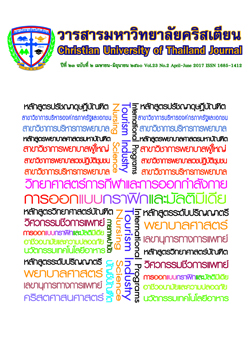ความเชื่อคริสเตียนและการสอนภาษาอังกฤษ : กรณีศึกษาครูคริสเตียนที่สอนภาษาอังกฤษในประเทศไทย
บทคัดย่อ
งานวิจัยนี้มีจุดมุ่งหมายเพื่อศึกษาอิทธิพล และความเชื่อมโยงระหว่างหลักความเชื่อของคริสเตียนและการสอนภาษาอังกฤษของมิชชันนารีในประเทศไทย จุดประสงค์หลักของคำถามวิจัยเพื่อศึกษาหลักความเชื่อของอีวานเจลีคัลคริสเตียนที่ส่งผลต่อการถ่ายทอดความเชื่อของครูมิชชันนารีที่เข้ามาสอนภาษาอังกฤษในประเทศไทย โดยงานวิจัยนี้ได้ศึกษามิชชันนารีจำนวน 10 คน ที่สอนภาษาอังฤษในโรงเรียนสอนภาษาแห่งหนึ่งในกรุงเทพมหานคร ผู้วิจัยได้เก็บข้อมูลโดยใช้การสัมภาษณ์เชิงลึกรูปแบบกึ่งมีโครงสร้าง และการสังเกตชั้นเรียนผลการศึกษาแสดงแนวความคิดหลัก 3 ประการที่มีอิทธิพลนำไปสู่การถ่ายทอดความเชื่อในการสอน คือ การทรงสร้างของพระเจ้า พันธกิจในฐานะผู้เชื่อ และการทรงเรียกจากพระเจ้างาน วิจัยนี้แสดงให้เห็นถึงความสัมพันธ์ระหว่างความเชื่อทางศาสนาในส่วนบุคคลของครูผู้สอน และการถ่ายทอดในการสอน อีกทั้งช่วยสร้างความเข้าใจที่ดีขึ้นสำหรับจุดเชื่อมโยงระหว่างความเชื่อคริสเตียนและการสอนภาษาอังกฤษของมิชชันนารีในประเทศไทย
เอกสารอ้างอิง
Baurain, B. (2012). "Beliefs into practice : A religious inquiry into teacher knowledge". Journal of Language, Identity, and Education.11(5): 312-332.
Bernard, H. R. (2006). Research methods in anthropology. Thousand Oaks, CA: SAGE.
Bebbington, D. W. (1989). Evangelicalism in modern britain : A history from the 1730s to the 1980s. London : Unwin Hyman.
Borg, S. (2003). "Teacher cognition in language teaching : A review of research on what language teachers think, know, believe, and do. Language Teaching ". 36 (2): 81-109.
Chaiwan, S. (1976). A Comparative historical study of roman catholic and protestant missions in Thailand. Bangkok : Suriyaban Publishing House. Chaiwan, S.(1984). "A study of christian mission in Thailand". East Asia Journal of Theology. 2 (1): 62-74.
Christian Volunteers in Thailand. (2012). Prospective teachers. Retrieved February 18, 2014 from https://teachingenglishinthailand.org/?page_id=12.
Elshtain, J. B. (2002). Does, or should, teaching reflect the religious perspective of the teacher? In A. Sterk (Ed.), Religion, scholarship, and higher education: Perspectives, models, and future prospects. South Bend. University of Notre Dame Press.
Feredy, J. and Muir-Cochraner, E. (2006). “Demonstrating rigor using thematic analysis : A hybrid approach of inductive and deductive coding and theme development.” International Journal of Qualitative Methods. 5 (1): 80-92.
Freeman, D. and Johnson, K. E. (1998). “Reconceptualizing the knowledge -base of language teacher education”. TESOL Quarterly. 32 (1): 397-417.
Given, L. M. (2008). The SAGE encyclopedia of qualitative research methods.Thousand Oaks. California: SAGE.
Hammerness, K., Darling-Hammond, L. and Bransford, J. (2005). How teachers learn and develop. InL. Darling-Hammond and J. Bransford, (Eds.), Preparing teachers for a changing world: What teachers should learn and be able to do. San Francisco: Jossey-Bass.
Jacques, M. (2010). Mission and evangelism : An ecumenical affirmation. In World Council of Church. (Ed.), You are the light of the world: Statements on mission the World Council of Churches. Geneva: WCC Publications.
Jesus Film. (2016). About jesus film project. Retrieved July 20, 2016 from https://www.jesusfilm.org/about.htm.
Komchadleuk.(2013). Let's learn english with volunteer english-speaking teachers. Kom Chad Luek.Retrieved February 18, 2015 from https://www.komchadluek.net/news/detail/168690
Lincoln, Y. S.and Guba, E. G. (1985). Naturalistic inquiry. California: SAGE.
Merriam, S. B. (2009). Qualitative research: A guide to design and implementation. San Francisco: Jossey-Bass.
Nespor, J. (1987). “The role of beliefs in the practice of teaching”. Journal of Curriculum Studies. 19 (4): 317-328.
Patton, M. Q. (2001). Qualitative evaluation and research methods. 3 ed. Newbury Park, California: SAGE.
Saiyasak, C. (2003). The history of christian interactions with buddhist Thais during pioneer protestant missionary era in Thailand, 1828-1860. Paper presented at Evangelical Theological Faculty's Doctoral Colloquium, Lueven, Belgium.
Southern Baptist Convention. (2000). The baptist faith and message. Retrieved January 10, 2015 from https://www.sbc.net/bfm2000/bfm2000.asp.
Varghese, M. and Johnston, B. (2007). “Evangelical christians and english language teaching” TESOL Quarterly. 41 (1): 5-31.



